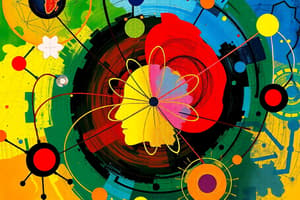Podcast
Questions and Answers
What distinguishes scientific theories from scientific laws?
What distinguishes scientific theories from scientific laws?
- Theories are based on experimental procedures, while laws are based on observation.
- Theories provide explanations for observations, whereas laws describe fundamental relationships. (correct)
- Laws can be modified with new evidence, but theories remain static.
- Theories are universally accepted, while laws are often debated.
Which statement best represents the nature of scientific knowledge?
Which statement best represents the nature of scientific knowledge?
- Scientific knowledge evolves as new discoveries challenge existing concepts. (correct)
- Scientific knowledge is based primarily on individual beliefs and opinions.
- Scientific knowledge is primarily derived from anecdotal evidence.
- Scientific knowledge is fixed and rarely changes over time.
How is scientific knowledge treated within the scientific community?
How is scientific knowledge treated within the scientific community?
- It is primarily influenced by the prevailing opinions of leading scientists.
- It is immune to criticism as it is based on factual evidence.
- It is kept confidential to protect intellectual property.
- It undergoes scrutiny through peer review to ensure credibility. (correct)
What does the interconnectedness of scientific disciplines imply?
What does the interconnectedness of scientific disciplines imply?
Which characteristic accurately describes scientific laws?
Which characteristic accurately describes scientific laws?
What is a fundamental characteristic of scientific knowledge?
What is a fundamental characteristic of scientific knowledge?
What is the role of peer review in the scientific community?
What is the role of peer review in the scientific community?
In the scientific method, which step follows the hypothesis formulation?
In the scientific method, which step follows the hypothesis formulation?
Which field examines the interactions of living organisms?
Which field examines the interactions of living organisms?
What does reproducibility in science ensure?
What does reproducibility in science ensure?
What aspect must a scientific hypothesis possess?
What aspect must a scientific hypothesis possess?
Which of the following best describes scientific inquiry?
Which of the following best describes scientific inquiry?
What is crucial for ensuring objectivity in scientific research?
What is crucial for ensuring objectivity in scientific research?
Flashcards
Scientific Laws
Scientific Laws
Describe fundamental relationships observed universally under specific conditions.
Scientific Theories
Scientific Theories
Well-substantiated explanations of data, patterns, and relationships explaining the natural world.
Tentative Nature of Science
Tentative Nature of Science
Scientific knowledge can be improved or changed with new evidence.
Progressive Nature of Science
Progressive Nature of Science
Signup and view all the flashcards
Open to Scrutiny
Open to Scrutiny
Signup and view all the flashcards
What is Science?
What is Science?
Signup and view all the flashcards
What are Natural Sciences?
What are Natural Sciences?
Signup and view all the flashcards
What is Physics?
What is Physics?
Signup and view all the flashcards
What is Chemistry?
What is Chemistry?
Signup and view all the flashcards
What is Biology?
What is Biology?
Signup and view all the flashcards
What is the Scientific Method?
What is the Scientific Method?
Signup and view all the flashcards
What is Evidence-Based?
What is Evidence-Based?
Signup and view all the flashcards
What is Falsifiability?
What is Falsifiability?
Signup and view all the flashcards
Study Notes
Introduction to Science
- Science is a systematic approach to understanding the natural world.
- It involves observation, experimentation, and the formulation of testable explanations.
- Science seeks to identify and understand patterns, relationships, and causality in natural phenomena.
- Scientific knowledge is constantly evolving and refined based on new evidence and discoveries.
- Scientific inquiry is a process of investigation that allows us to understand the world around us.
Branches of Science
- Natural Sciences: Focus on natural phenomena. Examples include:
- Physics: Studies matter, energy, motion, and forces.
- Chemistry: Studies the composition, structure, properties, and reactions of matter.
- Biology: Studies living organisms and their interactions.
- Astronomy: Studies celestial objects and phenomena.
- Geology: Studies the Earth, its composition, structure, processes, and history.
- Meteorology: Studies weather patterns and phenomena.
- Oceanography: Studies the oceans and marine life.
Scientific Method
- Observation: Notice a phenomenon or problem.
- Question: Ask a specific question about the observation.
- Hypothesis: Propose a testable explanation for the question.
- Prediction: Formulate a prediction based on the hypothesis.
- Experiment: Design and conduct an experiment to test the prediction.
- Analysis: Analyze the data collected during the experiment.
- Conclusion: Draw a conclusion based on the analysis of the results, which may support or refute the hypothesis.
- Communication: Share the findings with the scientific community. This is crucial for peer review and further investigation.
Key Concepts in Science
- Evidence-based: Scientific knowledge is based on empirical evidence, which is information gained through observation and experimentation.
- Testability: Scientific hypotheses and theories must be testable through experiments or observations.
- Reproducibility: Scientific experiments and observations should be reproducible by other researchers to ensure the validity of the results.
- Falsifiability: A scientific hypothesis or theory must be potentially disprovable or falsifiable.
- Objectivity: Scientists should strive to maintain objectivity in their observations, interpretations, and conclusions. Bias can undermine scientific integrity.
- Peer Review: Science relies on a system of peer review to assess the validity and quality of research before it's published. This ensures rigor and accuracy before wider distribution.
Scientific Laws and Theories
- Scientific laws describe fundamental relationships that are universally observed under specific conditions.
- Scientific theories explain the natural world through a well-substantiated explanation of data, patterns, and relationships. Theories are not guesses, but rather explain observations and unify a body of research, which is constantly being tested and refined with new evidence.
The Nature of Scientific Knowledge
- Tentative: Scientific knowledge is subject to revision and refinement as new evidence emerges.
- Progressive: Scientific knowledge builds upon itself through the accumulation and integration of new discoveries.
- Based on evidence: Scientific knowledge is underpinned by evidence and not influenced by opinions or beliefs.
- Open to scrutiny: Scientific claims are critically examined by the scientific community through peer review.
- Interconnectedness: Scientific disciplines interact and overlap significantly. For instance, biology often integrates concepts from chemistry and physics.
Studying That Suits You
Use AI to generate personalized quizzes and flashcards to suit your learning preferences.



